Hong Kong News

Is compulsory use of ‘Leave Home Safe’ boon or bane for Hong Kong restaurants?
Hong Kong officials are taking an educational rather than punitive approach in enforcing the compulsory use of the government’s Covid-19 risk-exposure app in restaurants.
But as the universal use of the “Leave Home Safe” app took effect on Thursday, some food and beverage outlets said they had to turn away customers, especially older people who did not have the app on their smartphones, or refused to use it.
Several patrons who spoke to the Post said they had no trouble using the app when eating out, and found it easier than filling in their particulars on paper.
Some also suggested making the process easier by incorporating the app’s functions into the Octopus contactless stored value card which is widely used, especially by older Hongkongers.
Food and Environmental Hygiene Department deputy director Diane Wong Shuk-han told a radio show on Thursday she did not foresee any issues with extending the use of the app as officials had told the dining sector in advance about its compulsory use and communicated clearly to them.
She assured business owners that they would not be punished if they took reasonable steps, including checking customers’ details to ensure that they did not present a fake version of the app.
“As long as they have done so, it counts as taking ‘reasonable steps’. Of course, customers must also bear responsibility for the information they provide,” she said.
Enforcement officers would be more lenient initially, she added, giving advice and warnings rather than imposing penalties.
The app was introduced a year ago to help health authorities trace close contacts of Covid-19 patients. Downloaded onto a smartphone, it is used to scan QR codes at venue entrances to log the user’s entry without collecting personal data or tracking movements in real-time.
The government has assured Hongkongers repeatedly that data is saved only on the user’s mobile device and in an encrypted format, but some still have privacy concerns. So far, the app has been downloaded more than 7 million times.
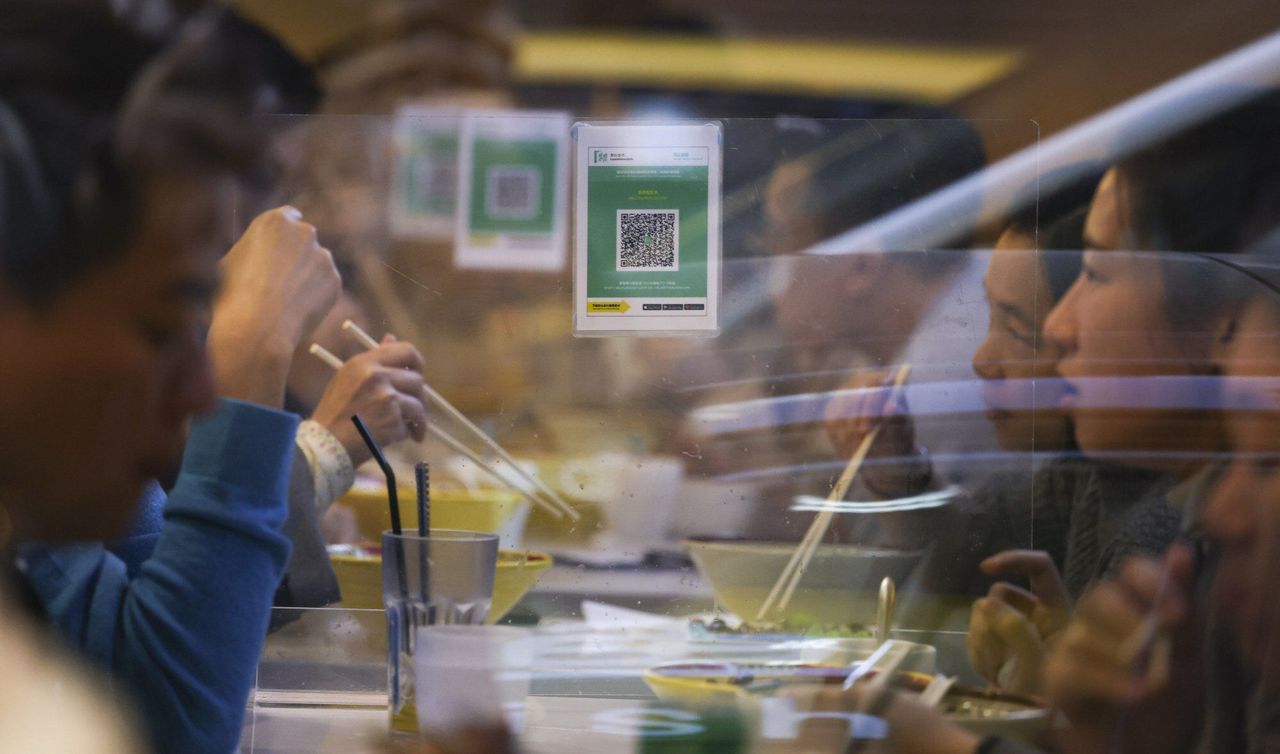 The mandatory use of the “Leave Home Safe” app means diners can no longer write down their contact information on paper.
The mandatory use of the “Leave Home Safe” app means diners can no longer write down their contact information on paper.
Last month, the use of the app was made mandatory for entry to public buildings such as government offices, wet markets and leisure facilities, prompting many to buy cheap second-hand phones to download it.
On Thursday, its use was extended to all 16,000 licensed bars and restaurants in the city, as well as for entry to entertainment establishments such as party rooms, cinemas, nightclubs, karaoke venues and mahjong parlours.
Patrons no longer have the option of simply writing down their contact information on paper.
Only people younger than 15 or older than 65, the disabled, the homeless and those unable to use a smartphone are exempted from using the app.
The new requirement is part of Hong Kong’s efforts to combat the pandemic and pave the way for resuming quarantine-free travel to mainland China.
As the rule kicked in on Thursday, some restaurant workers said they had to turn away business.
At a Wan Chai cha chaan teng, or local cafe, waiter Edward Ng said some customers walked away when they realised they could not just write down their particulars and enter. Others switched to ordering takeaway, which does not require scanning the QR code.
“Usually our breakfast services are booming, but today the crowd is a lot smaller,” he said. “When some customers heard they could only scan the QR code, they were a bit resistant.”
At Lucky City Restaurant in Wong Tai Sin, a waitress named Choi, 30, said some older people appeared unfamiliar with using the app and were reluctant to have their morning dim sum.
She suggested incorporating the app’s data into Octopus cards, which are widely used by older people.
Dr Ho Pak-leung, an infectious diseases expert at the University of Hong Kong, seconded the idea. “Many senior citizens tap the Octopus, which could serve the same purpose as the app,” he said.
Although people over 65 are exempted from using the app, even some in their 50s and early 60s were still having difficulty with it.
Several diners at a Wan Chai brunch spot told the Post that given the choice, they preferred writing down their particulars on paper instead of using the app because of privacy concerns.
Grace Yuen, 79, said it took her about two weeks to learn how to use the app. “I’d prefer to write on paper slips. I also avoid going to wet markets that require me to scan the app.”
A civil servant surnamed Ma, who preferred to use the app “as little as possible”, said: “But now I don’t have a choice, I can’t say no.”
At a Causeway Bay eatery, health care worker David was among patrons who chose to order takeaway. He said he had not downloaded the app and might consider buying a cheap smartphone for it, as he still had privacy concerns.
A 50-year-old arts performer, who declined to be named, said he did not see any problem with extending the use of the app. “I’ve been using the ‘Leave Home Safe’ app for months because I go in and out of arts spaces often, so the new rules don’t affect me much.”
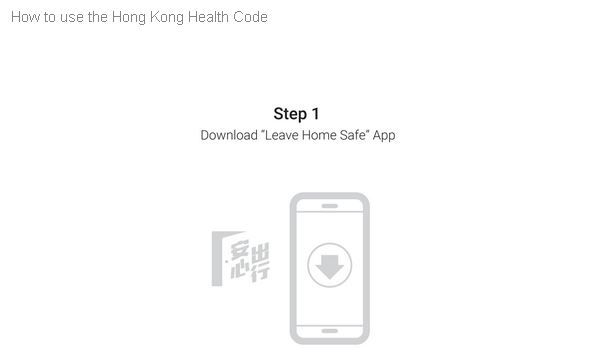
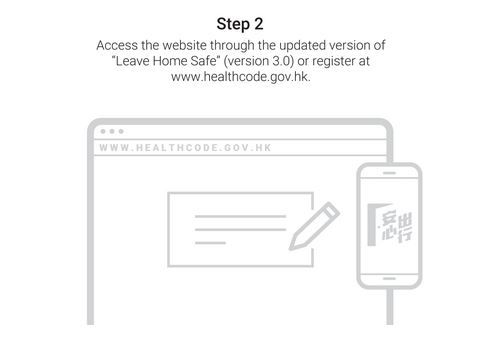
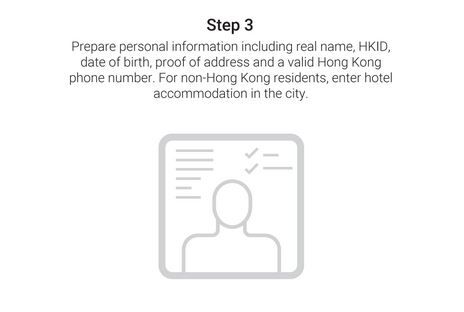
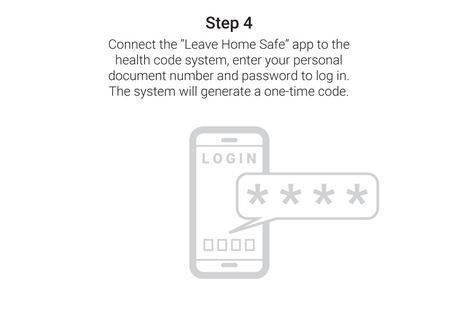
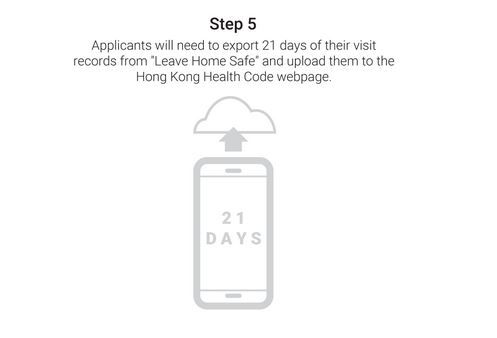
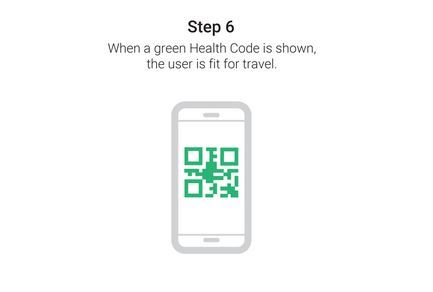
Buying a cheap phone just for the app would be meaningless from a privacy perspective, he added. “There are many other ways in which personal information can be leaked.”
Secondary student Charles Kong, 15, said: “I’ve always used the app so this isn’t an issue to me. I used to fill in the forms during the earlier days but it was just inefficient.”
Several people in the Wan Chai lunchtime crowd said they had no problem using the app and agreed it was more convenient and quicker than filling in paper slips.
“If I get held up writing down my information at the entrance, those who scan the QR code quickly can cut the queue and enter before me,” said IT worker Leo Wong.
The mandatory use of the app has sparked a rise in demand for lower-cost smartphones.
Various models from Redmi, a subsidiary of smartphone giant Xiaomi selling entry-level and mid-range products, were out of stock at one stage earlier this week, while lower-end brands such as Nokia and Ulefone also became much sought after, said Francis Fong Po-kiu, honorary president of the Hong Kong Information Technology Federation.
“People who are concerned about their personal data are now choosing to buy a new smartphone costing less than HK$1,000 [US$128] to download the app,” he said.
An updated iteration of the app, version 3.0, will be available from Friday. It will allow users to access Hong Kong’s new health code, including a web page with users’ personal details, infection status and vaccination records, which will help them get government approval for travelling to mainland China.
The new health code is expected to pave the way for the long-awaited reopening of the city’s border with the mainland later this month.
The colour-coded system will effectively be an entry ticket to the mainland, with border officials clearing those whose QR codes are green, indicating that all is well.
City health authorities are considering whether residents living in the same building as a coronavirus case would see their codes turn red, while those in the surrounding area would have a yellow code to indicate elevated risk of infection.
Those who cross the border will also have to use the mainland health code app, which tracks their whereabouts via mobile phone signal data and can show the countries or cities they have visited over the previous 14 days.
When these changes kick in, even people over 65 who intend to visit the mainland will have to use the updated app and health code.
Sze Lai-Shan, deputy director of Society for Community Organisation (SoCO), a local charity supporting the underprivileged, urged the government to set up help stations in the community to show the elderly and needy how to use the app.
“The elderly have to be taught many times how to use apps as they’re usually unfamiliar with digital devices,” she said.
The Post previously reported that the Hong Kong Jockey Club and four telecoms firms planned to give away thousands of handsets and special offers for data plans, following the government’s call for charities to help those without smartphones so they could download the app.
“SoCO is willing to help with the distribution of phones if necessary,” Sze added. “It’d be great if the elderly can receive more attention and have their devices upgraded.”











